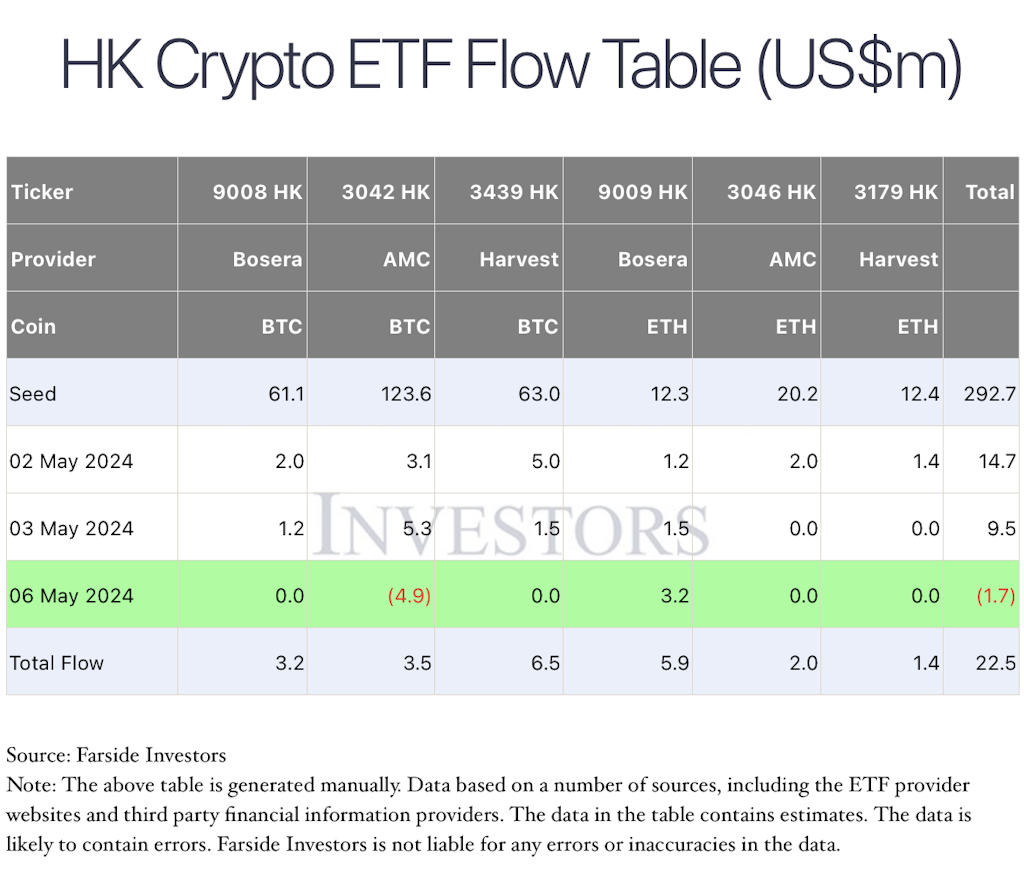
Hong Kong’s newly launched spot crypto ETFs might help us predict what ether ETF demand could look like in the US.
Or not.
Either way, the new funds offer a jumping-off point, so to speak, for considering the current differing investor appetites for ETH and BTC and how that could evolve.
The Securities and Exchange Commission approving spot bitcoin ETFs in January offered exhilaration during a month often marred by the holiday hangover.
Many wondered what the demand for these long-awaited products would amount to out of the gate, and long-term. Another common question after the industry’s regulatory victory: When will we see spot ether ETFs?
After all, ether is the second-biggest crypto asset by market capitalization, with its $370 billion market cap nearly a third of bitcoin’s $1.25 trillion. US issuers started trying to launch spot ETH products as far back as 2021.
Not to mention ether has a regulated futures market, and (whaddya know) the SEC already approved ETFs that hold ETH futures contracts. Those launched last October.
Though the regulator is set to rule on spot ether products sometime this month, it remains unclear when the SEC could ultimately allow those to trade.
Read more: Ether ETFs coming in May? Here’s why many are bearish
But aside from the launch timeline, the other question is what demand will be if and when they do debut.
Between ether futures ETF asset bases, US spot bitcoin fund flow data and the seed capital for Hong Kong bitcoin and ether offerings, perhaps we start to paint a picture.
Or maybe crypto-related fortune telling — even with data inputs — is a fool’s game.
Trying to make sense of the numbers anyway
Hong Kong’s six new spot crypto ETFs — three bitcoin funds and three ether funds — opened $292 million worth of seed capital, according to Farside Investors data.
The bitcoin funds attracted significantly more of the initial capital, with ether ETF day one assets amounting to 15% of that total, analyst Eric Balchunas noted.
He and others pointed to the seed capital for the offerings — used to fund the ETF’s creation units — as one indicator to compare demand for BTC and ETH. Subsequent flows into the six funds have been trivial at about $23 million over the last three trading days, making the seed capital perhaps the better barometer.

The US and Hong Kong differ of course, and the Hong Kong ETFs just launched. But at least we have some numbers to work with.
Sumit Roy, a senior analyst at ETF.com, said the initial 15% asset share for ether ETFs in Hong Kong sounds about right to him.
“It’s not peanuts,” he told Blockworks. “But with ether having much less name recognition that bitcoin, it’s natural that it would attract fewer investment dollars than bitcoin from ETF investors.”
Matthew Sigel, VanEck’s head of digital assets research, noted that the Hong Kong ETH funds accept in-kind subscriptions and redemptions — a feature the SEC is unlikely to allow for the proposed US ether ETFs.
Such a transaction model lets investors buy and sell ETF shares using the ETF’s underlying asset — in this case ETH — rather than cash.
Given that expected difference, the Hong Kong BTC-to-ETH ratio “may not be the best proxy” to predicting US demand, he argued — adding that they could collect less than 15% of the inflows that bitcoin funds have seen.
The 11 US spot bitcoin ETFs have combined for nearly $11.6 billion since most of them launched on Jan. 11.
‘Ethereum story’ has room to grow
While it would make sense for spot ether ETFs to initially see a similar percentage of bitcoin ETF assets in the US as they did in Hong Kong, Roy said, that might be short-lived.
“As the Ethereum story becomes more well known and people come to appreciate the yield — if it’s available to ETF investors — that comes from staking ether, they might even prefer the cryptocurrency over bitcoin,” he noted.
Whether ether ETFs are able to stake could be the key to wider adoption.
The Hong Kong funds do not offer that perk. Prospective spot ether ETF issuers in the US added language to their applications in recent months about staking the assets they hold.
Staking ether is the process of depositing ETH to help secure the Ethereum blockchain — and earning yield on that ETH for doing so.
Christopher Jensen, who leads crypto research at traditional finance giant Franklin Templeton, told Blockworks in an April interview that the simple “store-of-value” characteristics of bitcoin can be a “hang-up” for certain institutional investors.
ETH resonates with some of them better.
“A lot of times, [an investor will say] ‘with Ethereum, I understand that it generates revenues and has a yield and it looks more like a [traditional finance] asset,’” Jensen noted.
Roy said he expects ether ETFs to attract the same types of investors as bitcoin ETFs at first — albeit in lesser numbers. These include those that want to speculate on price or invest in an alternative store of value.
Sigel agreed that a non-staking ether ETF would likely be appealing to more speculators than long-term investors.
“But over time,” Roy added, “ether ETFs may attract a wider spectrum of investors compared to bitcoin ETFs when people come to appreciate that ether is much more than just a store of value.”
Start your day with top crypto insights from David Canellis and Katherine Ross. Subscribe to the Empire newsletter.






